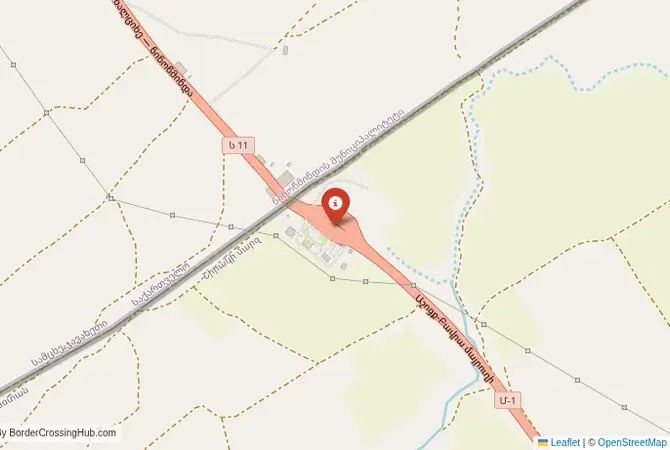
Approximate Border Location
Wait Times
15-60 min for pedestrians/vehicles
Operating Hours
Open 6:00 AM – 10:00 PM
Crossing Types
Pedestrians, vehicles
Border Type
Land crossing via road
Peak Times
Mornings (7-10 AM)
Daily Crossings
~1500 travelers/vehicles
Currency Exchange
Limited near Ninotsminda (GEL, AMD)
Safety Information
Rural, minimal crime
Languages Spoken
Georgian/Armenian
Accessibility Features
Ramps, assistance
About Bavra & Ninotsminda
A High-Altitude Crossing in a Land of Lakes
The border crossing connecting the town of Ninotsminda in Georgia with Bavra in Armenia is a journey through one of the most unique and dramatic landscapes in the Caucasus. This is a major international checkpoint, but its location on a high-altitude volcanic plateau gives it a remote and wild character. To cross here is to travel through the Javakheti region of Georgia, a land of vast, treeless plains, stunning alpine lakes, and a large, deeply rooted Armenian population. It is a passage through a landscape of harsh beauty and a powerful testament to the resilience of the people who call this challenging environment home.
Operational Details
This checkpoint connects Georgia’s Samtskhe-Javakheti region with the Shirak Province of Armenia. It is a major international crossing, open 24/7 to all passenger cars, buses, and commercial freight. The facility is modern and designed to handle a significant volume of traffic. It is the most direct route for traffic moving between central Georgia and the second-largest Armenian city, Gyumri. The crossing is located at an altitude of over 2,000 meters, and it can be subject to extreme winter conditions, with heavy snow and bitter cold sometimes making travel difficult.
Before Crossing
Crossing borders gets messy sometimes, think political flare-ups or gates shutting fast. Good travel insurance is a must for handling doctor visits, trip disruptions, or security scares. Don’t get caught unprepared. To find a policy that’s got your back, check out reliable plans today for peace of mind.
A History of the Javakheti Armenians
The history of this region is the history of the Javakheti Armenians. While the region has been part of various Georgian kingdoms for centuries, the current Armenian population are largely descendants of immigrants who fled the Ottoman Empire in the 1820s and were settled here by the Russian Empire. They have preserved their language, culture, and Armenian Apostolic faith in this high, isolated plateau. The modern border, a legacy of the Soviet administrative divisions, created a new political reality for this community. This crossing is their most vital link to their cultural homeland, a lifeline for family, religious, and economic connections with Armenia.
Border Crossing Procedure
The border crossing procedure is a standard two-part process. You will first complete exit formalities at one country’s checkpoint and then proceed to the other country’s checkpoint for entry inspection. You will need a valid passport. Many nationalities can enter both countries visa-free, but it is essential to check the specific requirements for your nationality in advance. Vehicle registration and international insurance (Green Card) are also necessary. You may be required to pay an environmental or road tax upon entering Armenia. The process is generally straightforward, but queues can form, especially with freight traffic.
The Surrounding Region: Georgia Side
On the Georgian side, the crossing is in the heart of the Javakheti Protected Areas. The landscape is dominated by a series of large, beautiful alpine lakes, including Paravani, Tabatskuri, and Saghamo. The region is a paradise for birdwatchers, with huge numbers of migratory birds using the lakes as a stopover point. The town of Ninotsminda is the main center of the region. The nearby town of Akhalkalaki is the cultural and political capital of the Javakheti Armenians. The magnificent medieval cave city of Vardzia is also accessible from this route.
The Surrounding Region: Armenia Side
On the Armenian side, the crossing is in the Shirak Province, a high-altitude plateau known for its harsh winters and its strong cultural identity. The road from the border leads directly to the city of Gyumri, the second-largest city in Armenia. Gyumri has a beautiful and unique historic center, with elegant 19th-century buildings made from black and red tuff stone. The city was devastated by a massive earthquake in 1988 but has been slowly and lovingly rebuilt. It is a city of great artists, poets, and craftsmen, a place of immense resilience and spirit. The ancient Marmashen Monastery is also located near Gyumri.
Practical Travel Information
Practical planning is essential for this route. You must have a suitable vehicle and be prepared for high-altitude driving. Check the weather and road conditions before you set out, especially in winter. The official currencies are the Georgian Lari (GEL) in Georgia and the Armenian Dram (AMD) in Armenia. Currency exchange facilities are available at the border. Ensure your vehicle’s Green Card insurance explicitly covers both Georgia and Armenia. Services are limited between the main towns, so it is wise to have a full tank of fuel.
Final Considerations
The Ninotsminda–Bavra border crossing is a journey through a landscape of stark, breathtaking beauty and a region with a unique and proud culture. It is a vital link for the Armenian community of Javakheti and a gateway to the beautiful city of Gyumri. It is a passage that is defined by its high altitude, its wide-open spaces, and its resilient people. For the traveler looking to explore the stunning lakes of Javakheti and the historic heart of Armenia, it is an essential and unforgettable route.
No reviews yet.
